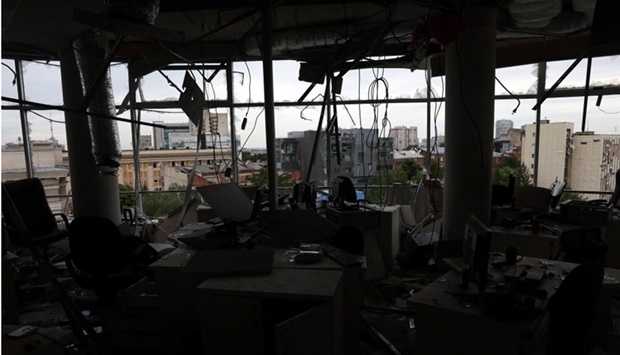* Capture of Sievierodonetsk would be big gain for Russia
* Ukraine says Russia launches widespread shelling
* Dozens of missiles hit Ukrainian military bases
Ukrainian troops have "almost left" Sievierodonetsk after weeks of intense fighting against Russian forces, the mayor of the eastern city said on Saturday, signalling the biggest reversal for Ukraine since losing the port of Mariupol in May.
As Europe's biggest land conflict since World War Two entered its fifth month, a volley of Russian missiles also rained down on military facilities in western and northern Ukraine and on a southern city, Ukrainian officials said.
Russian President Vladimir Putin sent tens of thousands of troops over the border on Feb. 24, unleashing a conflict that has killed thousands and uprooted millions. It has also stoked a global energy and food crisis.
Since abandoning an early advance on the capital Kyiv in what it called a "special military operation", Russia and its proxies have shifted their main focus to the Donbas, an eastern territory made up of Luhansk and Donetsk provinces.
The retreat from Sievierodonetsk, if confirmed, would bring Moscow close to full control of Luhansk, with Ukrainian troops in the province largely holding out only in Sievierodonetsk's twin city Lysychansk, across the Siverskyi Donets river.
"Unfortunately, they have almost left the city," Mayor Oleksandr Stryuk said on national television. He did not confirm whether a full withdrawal was underway after regional authorities said on Friday that Ukraine was set to withdraw its troops from there.
Russia's pro-Kremlin Izvestia newspaper said one of its correspondents had arrived in the Azot industrial zone of Sievierodonetsk, where Ukrainian forces had been making a stand in recent weeks.
Ramzan Kadyrov, the head of Russia's Chechnya region which has troops fighting alongside regular Russian army units in Ukraine, said on social media on Saturday that Sievierodonetsk's industrial zone and airport had been 'fully liberated'.
The capture of Sievierodonetsk would be likely to seen by Russia as vindication for its switch from its early, failed attempt at "lightning warfare" to a slower grinding offensive which relies more on long-range shelling.
Moscow has recognised Luhansk and Donetsk as independent countries and demanded Ukraine cede the entire territory of the two provinces to separatist administrations.
Kharatin Starskyi, the press officer of a Ukrainian National Guard brigade, said on television on Saturday that the flow of information about the withdrawal from Sievierodonetsk had been delayed to protect troops on the ground.
"During the last (several) days, an operation was conducted to withdraw our troops," Starskyi said.
Serhiy Gaidai, governor of the Luhansk region, said Russian forces had attacked Sievierodonetsk's industrial zone on Friday and also attempted to enter and blockade Lysychansk.
Elsewhere in Ukraine, governors of western and northern regions reported multiple missile attacks, indicating that Russia was not limiting its assault to eastern territories.
"48 cruise missiles. At night. Throughout whole Ukraine," Ukrainian presidential adviser Mykhailo Podolyak said on Twitter. "Russia is still trying to intimidate Ukraine, cause panic and make people be afraid."
The governor of Lviv region in western Ukraine, Maxim Kozytskyi, said in a video posted online that six missiles were fired from the Black Sea at the Yavoriv base near the border with Poland. Four hit the target but two were destroyed.
In the north, Vitaliy Bunechko, governor of the Zhytomyr region, said strikes on a military target killed at least one soldier, adding that nearly 10 missiles had been intercepted and destroyed.
In the south, Oleksandr Senkevych, mayor of Mykolaiv near the Black Sea, said five cruise missiles hit the city and nearby areas on Saturday. The number of casualties was being clarified. Reuters was not able to independently confirm the various reports.
Russia denies targeting civilians. Kyiv and the West say Russian forces have committed war crimes against civilians.
Despite Ukraine's battlefield setbacks, it has won support from the West which has imposed an unprecedented package of sanctions on Russia, its top companies and its business and political elite in response to Moscow's invasion of Ukraine.
The war has had a massive impact on the global economy and European security arrangements, driving up gas, oil and food prices, pushing the EU to reduce its heavy reliance on Russian energy and prompting Finland and Sweden to seek NATO membership.
Western countries have supplied weapons to Ukraine.
Ukraine's top general Valeriy Zaluzhnyi wrote on the Telegram app on Saturday that U.S.-supplied HIMARS rocket systems are now working and hitting targets in Russian-occupied parts of Ukraine.
Leaders of the Group of Seven rich democracies are expected to demonstrate long-term support for Ukraine and discuss how to tighten the screws on Russia at a three day summit in Germany starting on Sunday.
British Prime Minister Boris Johnson, who will take part, said he feared Ukraine could face pressure to agree a peace deal with Russia and that the consequences of Putin getting his way in Ukraine would be dangerous to international security.
In a major sign of support, European Union leaders this week approved Ukraine's formal candidacy to join the bloc - a decision that Russia said on Friday amounted to the EU's "enslaving" of neighbouring countries.
Russia says it sent troops into Ukraine to degrade its southern neighbour's military capabilities and root out people it called dangerous nationalists.
Ukraine says Russia has launched an imperial-style land grab and it will never surrender its territory to Russia.
International / UK/Europe
Ukraine troops 'almost left' Sievierodonetsk as Russian missiles pound north, west

The aftermath of a shelling on an office building near the centre of Kharkiv, which hadn’t been shelled in weeks, as Russia’s attack on Ukraine continues in Kharkiv, Ukraine. REUTERS
